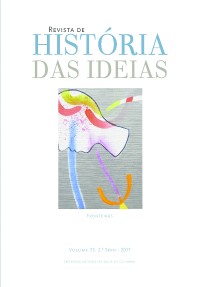Please use this identifier to cite or link to this item:
https://hdl.handle.net/10316.2/93121| Title: | O reverso da memória e o efeito multiescalar da fronteira: reconfigurações culturais entre Portugal e Brasil (1888-1934) | Other Titles: | The reverse of memory and the multiscale effect of the frontier: cultural reconfigurations between Portugal and Brazil (1888-1934) | Authors: | Paredes, Marçal de Menezes Skolaude, Mateus Silva |
Keywords: | Luso-Brazilian relationship;frontier;collective memories;national identities;cultural studies;Relações Luso-Brasileiras;fronteira;memórias coletivas;identidades nacionais;estudos culturais | Issue Date: | 2017 | Publisher: | Imprensa da Universidade de Coimbra | Abstract: | Este artigo analisa os jogos de memórias e expectativas observados
entre intelectuais e portugueses e brasileiros que manifestaram
apreensões relativas a uma putativa ligação luso-brasileira.
Nossas reflexões situam-se em dois momentos históricos precisos:
a proclamação da República no Brasil (1889) e a realização da 1ª
Exposição Colonial do Porto (1934). Para além da importância dos
eventos em si, interessa-se pela dimensão da crispação de memórias projetivas sobre uma pretensa marca da lusitanidade na América e na
África. Nos dois momentos destaca-se a questão da unidade territorial
relacionada às hermenêuticas identitárias. O temor da perda de unidade
em escala americana, no final do XIX, ou em seus desdobramentos em
escala africana, no século XX, buliam na compreensão sobre dada
«lusitanidade». A fronteira, como conceito, revela-se um mecanismo
de aglutinação de expectativas que interpela diferentes dimensões
escalares de referência (Europa, América e África), sendo elemento
constituidor do preenchimento contextual e discursivo das identidades
nacionais. This paper analyses the memory and expectation games observed between Portuguese and Brazilian intellectuals in observance of their apprehension linked to a putative luso-brazilian relationship. It is focused on two specific historical contexts: the Brazilian Republic Proclamation (1889) and the First Colonial Exposition in Porto (1934). Beyond the importance of those events, it is interested on the dimensions of the tightening of memories projected about the future of the Lusitanian brand in America and Africa. In both cases, the land unity related to the identity hermeneutics stands out. The fear of lack of unity in American scale, in XIX century, or the fear of its unfolding in Africa in the future, in XX century, touches the understanding of the Lusitanianness. The frontier, as a concept, reveals itself as a machinery that condensate expectations and requests different scales and dimensions (Europe, America, Africa) in a contextual and discursive process that makes national identities. |
URI: | https://hdl.handle.net/10316.2/43306 | ISSN: | 0870-0958 2183-8925 (PDF) |
DOI: | 10.14195/2183-8925_35_7 | Rights: | open access |
| Appears in Collections: | Revista de História das Ideias |
Files in This Item:
| File | Description | Size | Format | |
|---|---|---|---|---|
| o_reverso_da_memo_ria_e_o_efeito_multiescalar_da_fronteira__reconfigurac_o_es_culturais_entre_portugal_e_brasil__1888-1934_.pdf | 1.18 MB | Adobe PDF |  |
Items in DSpace are protected by copyright, with all rights reserved, unless otherwise indicated.
